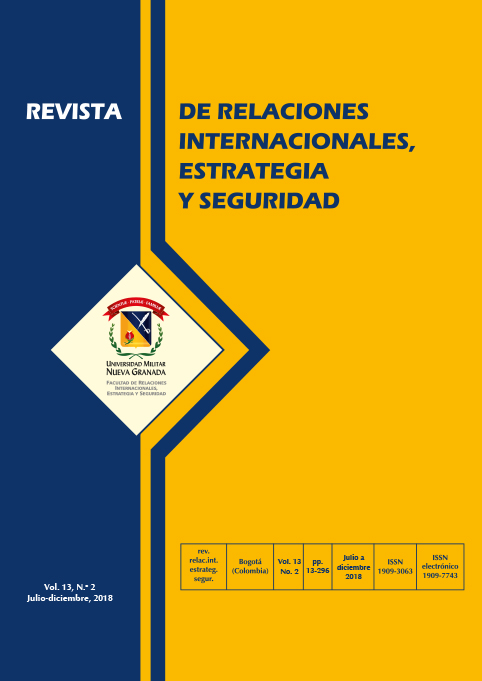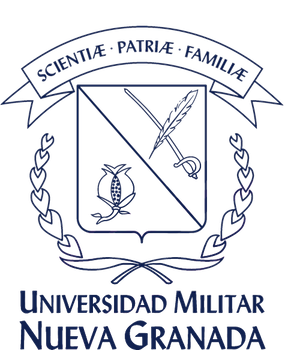La importancia de corea del norte para China
Resumen
El presente trabajo examina la reciprocidad de alianza y dependencia de la República Popular de China (China) con la República Popular Democrática de Corea (Corea del Norte), estableciendo desde una posición neorrealista en Relaciones Internacionales que, si bien Corea del Norte depende de China para su estabilidad interna y de seguridad externa, China mantiene esta alianza como elemento prioritario de desarrollo y seguridad geopolítica. Se plantea una visión historica de la relación para mostrar el factor de conveniencia en sus constantes distanciamientos y acercamientos, y se analizan los componetes militar y economico como factores de poder, así como el institucionalismo internacional como un elemento que aporta al realismo en la política China hacia Corea del Norte. De tal forma, se muestra que las acciones de China en apoyo a Corea del Norte, sobre todo en el ámbito económico y políticos, no están supeditados al alejamiento norcoreano de las normas y estándares del sistema internacional, sino a la estructuración de una península coreana estable, con un aliado que le permita un equilibrio de poder geopolítico no supeditado a otros Estados.
Descargas
Disciplinas:
Relaciones InternacionalesLenguajes:
esAgencias de apoyo:
Universidad de GuadalajaraReferencias bibliográficas
Bush, G. (29 de Enero de 2002). President Delivers State of the Union Address. Discurso 29 de Enero 2002. Washington, D.C., Estados Unidos: The White House. Obtenido de https://georgewbushwhitehouse.archives.gov/news/releases/2002/01/2002012911.html
Bush, G. (14 de Mayo de 2013). The American Presidency Project. Obtenido de Joint Statement Between the United States of America and the Republic of Korea: Common Values, Principles, and Strategy: http://www.presidency.ucsb.edu/ws/index.php?pid=64888&st=roh+moo-hyun&st1=
Buzan, B. (1998). Security: A new Framework for Analysis. Londres: Lynne Rienner.
Carlin, R., & Jones, L. (2008). Policy in Context Negotiating with North Korea: 1992-2007. Freeman Spogli Institute for International Studies, Center for International Security and Cooperation. Stanford University. Obtenido de http://fsi.stanford.edu/sites/default/files/Negotiating_with_North_Korea_1992-2007.pdf
Cartwright, M. (03 de Noviembre de 2016). Ancient Korean & Chinese Relations. Obtenido de https://www.ancient.eu/article/984/
Central Intelligence Group. (03 de Enero de 1947). The Situation in Korea, 5/1. Recuperado el 02 de 11 de 2016, de Truman library: https://www.trumanlibrary.org/whistlestop/study_collections/korea/large/documents/pd fs/kr-8-4.pdf
China Daily. (29 de Agosto de 2003). US says "no intention" to attack N. Korea. Obtenido de http://www.chinadaily.com.cn/en/doc/2003-08/29/content_259636.htm
Clinto, W. J. (16 de Abril de 1996). The President's News Conference With President Kim Young-sam of South Korea in Cheju. Obtenido de The American Presidency Project: http://www.presidency.ucsb.edu/ws/index.php?pid=52677
Consejo de Seguridad de Naciones Unidas. (14 de octubre de 2006). Meetings conducted by the Security Council in 2006. Obtenido de Resolución 1718 S/PV.5551: http://www.un.org/en/ga/search/view_doc.asp?symbol=S/PV.5551
George C. Marshall Institute. (09 de 12 de 2017). Center for Strategic and International Studies (CSIS). Obtenido de Missile Defense Project: http://missile.wpengine.com/country/dprk/
Herz, J. (1950). Idealist Internationalism and the Security Dilemma. World Politics, 2(2), 157-180. https://doi.org/10.2307/2009187
Harvard University Atlas of Economic Complexity (2018). What did North Korea export in 2016. Recuperado el 10 de 01 de 2018, de http://atlas.cid.harvard.edu/explore/?country=178&partner=undefined&product=undefined&productClass=HS&startYear=undefined&target=Product&year=2016
Jing-yi, J. (2016). Simultaneous Promotion of Denuclearization and the Peace Treaty on the Korea Peninsula. 6.15 and Sunshine Policy, (págs. 29-48). Seoul. Obtenido de
León, J. E. (2005). Coopoeración y Conflicto en la Cuenca del Pacifico. México: Universidad Autonoma Metropolitana.
McDermott, R. (2004). Countering Global Terrorism: Developing The Antiterrorist Capabilities of The Central Asia Militaries. U.S. Army War College.
Mearsheimer, J. (Winter de 1994/95). The False Promise of International Institutions. International Security, 19(3), 5-49. Obtenido de http://mearsheimer.uchicago.edu/pdfs/A0021.pdf
Ministry of Foreign Affairs, the People's Republic of China. (29 de 07 de 2016). MFA News. Recuperado el 01 de noviembre de 2016, de China and Russia Hold the 4th Consultation on Northeast Asia Security: http://www.fmprc.gov.cn/mfa_eng/wjbxw/t1386345.shtml
Ministry of Unification of the Republic of Korea. (2018). South-North Relations, Data & Statistics. Recuperado el 10 de 01 de 2018, de http://www.unikorea.go.kr/eng_unikorea/relations/statistics/traffic/
Ministry of Unification of the Republic of Korea. (2014). Understanding North Korea. Seoul: Institute for Unification Education. Recuperado el 22 de 11 de 2016, de http://eng.unikorea.go.kr/content.do?cmsid=1817
Ministry of Unification Republic of Korea. (2003). Five Years of the Kim Dae-jung Administration Promoting Peace and Cooperation. Corea: OhSung. Obtenido de http://www.ncnk.org/resources/publications/KDJ_DPRK_Inter_Korean_Highlights_1998_2 003.pdf
MIT Observatory of Economic Complexity. (01 de 11 de 2017). North Korea (s.f.). Obtenido de http://atlas.media.mit.edu/en/profile/country/prk/
Park, J. S. (2005). Inside Multilateralism: The Six-Party Talks. The Washington Quarterly, 28(4), 7591. Recuperado el 10 de Noviembre de 2016, de http://isites.harvard.edu/fs/docs/icb.topic199080.files/Readings_for_November_6_/Park. Pdf. https://doi.org/10.1162/0163660054798726
Quansheng, Z. (1996). Interpreting Chinese Foreign Policy The Micro-Macro Linkage Approach. Nueva York: Oxford University Press.
Radchenko, S. (13 de 02 de 2015). Russia's Policy in the Run-Up to the First North Korean Nuclear Crisis, 1991-1993. Recuperado el 05 de 11 de 2016, de Wilson Center: https://www.wilsoncenter.org/publication/russias-policy-the-run-to-the-first-northkorean-nuclear-crisis-1991-1993
Reuters. (21 de Enero de 2016). Reuters World News. Obtenido de South Korea's Park seeks 5party talks on North's nuclear program: http://www.reuters.com/article/us-northkoreanuclear-park-idUSKCN0V009D
Ryutaro, H. (28 de Agosto de 1997). MOFA, Ministry of Foreign Affairs of Japan. Speech by Prime Minister Ryutaro Hashimoto Seeking a New Foreign Policy Toward China. Japón. Recuperado el 2 de Noviembre de 2016, de http://www.mofa.go.jp/region/asiapaci/china/seeking.html
Sanford, D. (1993). ROK's Nordpolitik: Revisted. The Journal of East Asian Affairs, 7(1), 1-31. Obtenido de http://www.jstor.org/stable/23254205
Scobell, A. (March de 2004). China and North Korea: From Comrades-in-Arms to Allies at Arm's Length. Obtenido de U.S. Army War College: http://www.strategicstudiesinstitute.army.mil/pdffiles/pub373.pdf
Seth, M. (2010). A History of Korea: From Antiquity to thje Present. US: Rowman & Littlefield Publishers.
Shanghai Communiqué. (27 de Febrero de 1972). Office of the Historian. Obtenido de Joint Statement Following Discussions With Leaders of the People's Republic of China: https://history.state.gov/historicaldocuments/frus1969-76v17/d203
Song, C. (18 de Diciembre de 2012). China Highlights. Recuperado el 5 de 10 de 2016, de http://www.chinahighlights.com/dandong/attraction/commemorative-museum-of-thewar-to-resist-u.s.-aggression-and-aid-north-korea.htm
Szalontai, B., & Radchenko, S. (2006). North Korea's Efforts to Acquire Nuclear Technology and Nuclear Weapons: Evidence from Russian and Hungarian Archives. Woodrow Wilson International Center for Scholars, Cold War International History Project. WWICS. Recuperado el 20 de noviembre de 2016, de https://www.wilsoncenter.org/sites/default/files/WP53_web_final1.pdf
The Ministry of Foreign Affairs of the Russian Federation. (24 de Julio de 2014). Foreign policy News. Recuperado el 01 de Noviembre de 2016, de Comment by the Russian Ministry of Foreign Affairs regarding the possibility of deployment of THAAD US air defences in the territory of the Republic of Korea: http://www.mid.ru/en/foreign_policy/news//asset_publisher/cKNonkJE02Bw/content/id/676887
U.S. department Of Defense. (07 de Julio de 2016). News release View, Release No: NR-254-16. Recuperado el 01 de 11 de 2016, de Republic of Korea and the United States Make Alliance Decision to Deploy THAAD to Korea: https://www.defense.gov/News/NewsReleases/News-Release-View/Article/831178/republic-of-korea-and-the-united-statesmake-alliance-decision-to-deploy-thaad
Waltz, K. (1988). Teoría de la Politica Internacional. Argentina: GEL.
Wolf, C., Wang, X., & Warner, E. (2013). China's Foreign Aid and Government-Sponsored Investment Activities Scale, Content, Destinations, and Implications. Corporation, National Defense Research Institute (NDRI) / RAND. Estados Unidos: RAND Corporation. Recuperado el 01 de 11 de 2016, de file:///C:/Users/camilo.garcia/Downloads/RAND_RR118.pdf
Woodrow Wilson Iternational Center for Scholars. (2012). DPRK Perspectives on Korean Reunification after the July 4th Joint Communiqué. North Korea International Documentation Project. Obtenido de https://www.wilsoncenter.org/sites/default/files/NKIDP_eDossier_10_DPRK_Perspectives _on_Korean_Reunification_after_the_July_4th_Joint_Communique_0.pdf
World Bank. (2017). Data Bank, Net official development assistance and official aid received. Recuperado el 01 de 12 de 2017, de http://data.worldbank.org/indicator/DT.ODA.ALLD.CD?end=2014&locations=KP&start=19 78&view=chart
YI, W. (26 de Agosto de 2003). Joint Interview by Xinhua News Agency, People's Daily, CCTV, CRI and China Daily. Recuperado el 15 de 11 de 2016, de Permanent Mission of the People´s Republic of China to the UN: http://www.china-un.org/eng/zt/ch/t25372.htm
Yi, W. (18 de Septiembre de 2013). Stay Committed to the Six-Party Talks for Lasting Peace. Recuperado el 01 de Noviembre de 2016, de Ministry of Foreign Affairs of the People's Republic of China: http://www.fmprc.gov.cn/mfa_eng/wjb_663304/wjbz_663308/2461_663310/t1078892.s html
YI, W. (30 de 08 de 2013). Vice FM Wang Yi, Head of Chinese Delegation to the Six-party Talks Gives a Press Conference. Obtenido de Permanent Mission of the People's Republic of China to the UN: http://www.china-un.org/eng/zt/ch/t25552.htm
Yi, W. (8 de Marzo de 2016). Ministry of Foreign Affairs of the People's Republic of China. Obtenido de Press Conference in the Fourth Session of the Twelfth National People's Congress: http://www.fmprc.gov.cn/mfa_eng/zxxx_662805/t1346238.shtml












